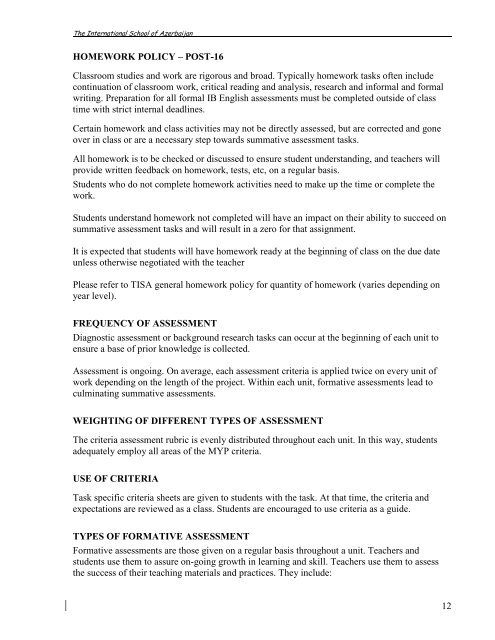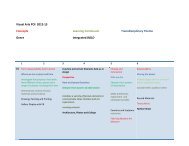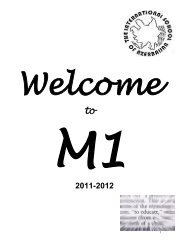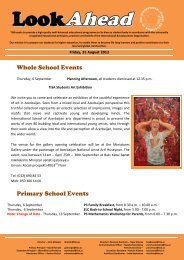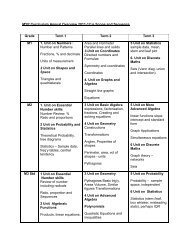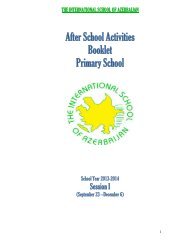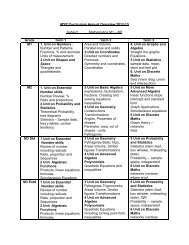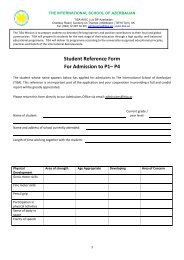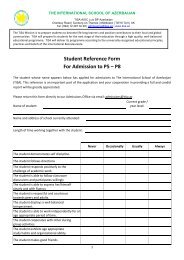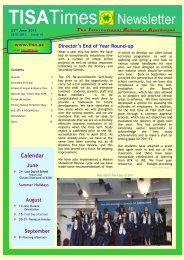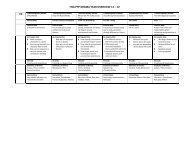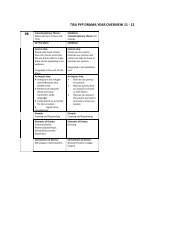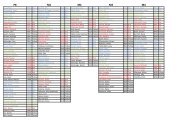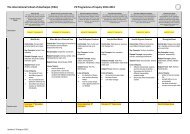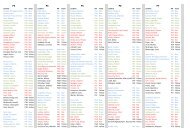Assessment Policy - The International School of Azerbaijan
Assessment Policy - The International School of Azerbaijan
Assessment Policy - The International School of Azerbaijan
Create successful ePaper yourself
Turn your PDF publications into a flip-book with our unique Google optimized e-Paper software.
<strong>The</strong> <strong>International</strong> <strong>School</strong> <strong>of</strong> <strong>Azerbaijan</strong><br />
HOMEWORK POLICY – POST-16<br />
Classroom studies and work are rigorous and broad. Typically homework tasks <strong>of</strong>ten include<br />
continuation <strong>of</strong> classroom work, critical reading and analysis, research and informal and formal<br />
writing. Preparation for all formal IB English assessments must be completed outside <strong>of</strong> class<br />
time with strict internal deadlines.<br />
Certain homework and class activities may not be directly assessed, but are corrected and gone<br />
over in class or are a necessary step towards summative assessment tasks.<br />
All homework is to be checked or discussed to ensure student understanding, and teachers will<br />
provide written feedback on homework, tests, etc, on a regular basis.<br />
Students who do not complete homework activities need to make up the time or complete the<br />
work.<br />
Students understand homework not completed will have an impact on their ability to succeed on<br />
summative assessment tasks and will result in a zero for that assignment.<br />
It is expected that students will have homework ready at the beginning <strong>of</strong> class on the due date<br />
unless otherwise negotiated with the teacher<br />
Please refer to TISA general homework policy for quantity <strong>of</strong> homework (varies depending on<br />
year level).<br />
FREQUENCY OF ASSESSMENT<br />
Diagnostic assessment or background research tasks can occur at the beginning <strong>of</strong> each unit to<br />
ensure a base <strong>of</strong> prior knowledge is collected.<br />
<strong>Assessment</strong> is ongoing. On average, each assessment criteria is applied twice on every unit <strong>of</strong><br />
work depending on the length <strong>of</strong> the project. Within each unit, formative assessments lead to<br />
culminating summative assessments.<br />
WEIGHTING OF DIFFERENT TYPES OF ASSESSMENT<br />
<strong>The</strong> criteria assessment rubric is evenly distributed throughout each unit. In this way, students<br />
adequately employ all areas <strong>of</strong> the MYP criteria.<br />
USE OF CRITERIA<br />
Task specific criteria sheets are given to students with the task. At that time, the criteria and<br />
expectations are reviewed as a class. Students are encouraged to use criteria as a guide.<br />
TYPES OF FORMATIVE ASSESSMENT<br />
Formative assessments are those given on a regular basis throughout a unit. Teachers and<br />
students use them to assure on-going growth in learning and skill. Teachers use them to assess<br />
the success <strong>of</strong> their teaching materials and practices. <strong>The</strong>y include:<br />
12


